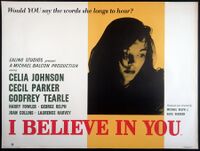I Believe In You: Difference between revisions
(Created page with "Category:Influences on Morrissey - Film and Television == Relevance == As mentioned in Autobiography: <blockquote> "The shadowy social films of lost Sunday television are Oliver Twist (1948) (in which career-criminal Bill Sikes says ‘There’s light enough for what I ’ave to do!’), London Belongs to Me (1948), The Blue Lamp (1950), I Believe in You (1952) and Sapphire (1959)." </blockquote> {{Page |DiscogsArtistId= |WikipediaPageTitle=I_Believe_in_You_(film...") |
No edit summary |
||
| (2 intermediate revisions by the same user not shown) | |||
| Line 1: | Line 1: | ||
[[Category:Influences on Morrissey - Film and Television]] | [[Category:Influences on Morrissey - Film and Television]] | ||
[[File:I Believe In You film poster.jpg | 200px | right | thumb |I Believe In You film poster]] | |||
== Relevance == | == Relevance == | ||
As mentioned in [[Autobiography]]: | As mentioned in [[Mention::Autobiography]]: | ||
<blockquote> | <blockquote> | ||
"The shadowy social films of lost Sunday television are Oliver Twist (1948) (in which career-criminal Bill Sikes says ‘There’s light enough for what I ’ave to do!’), London Belongs to Me (1948), The Blue Lamp (1950), I Believe in You (1952) and Sapphire (1959)." | "The shadowy social films of lost Sunday television are Oliver Twist (1948) (in which career-criminal Bill Sikes says ‘There’s light enough for what I ’ave to do!’), London Belongs to Me (1948), The Blue Lamp (1950), I Believe in You (1952) and Sapphire (1959)." | ||
Latest revision as of 16:45, 13 February 2023
Relevance
As mentioned in Autobiography:
"The shadowy social films of lost Sunday television are Oliver Twist (1948) (in which career-criminal Bill Sikes says ‘There’s light enough for what I ’ave to do!’), London Belongs to Me (1948), The Blue Lamp (1950), I Believe in You (1952) and Sapphire (1959)."
Wikipedia Information
 |
I Believe in You is a 1952 British drama film directed by Michael Relph and Basil Dearden, starring Celia Johnson and Cecil Parker and is based on the book Court Circular by Sewell Stokes. Inspired by the recently successful The Blue Lamp (1950), Relph and Dearden used a semi-documentary approach in telling the story of the lives of probation officers and their charges.
